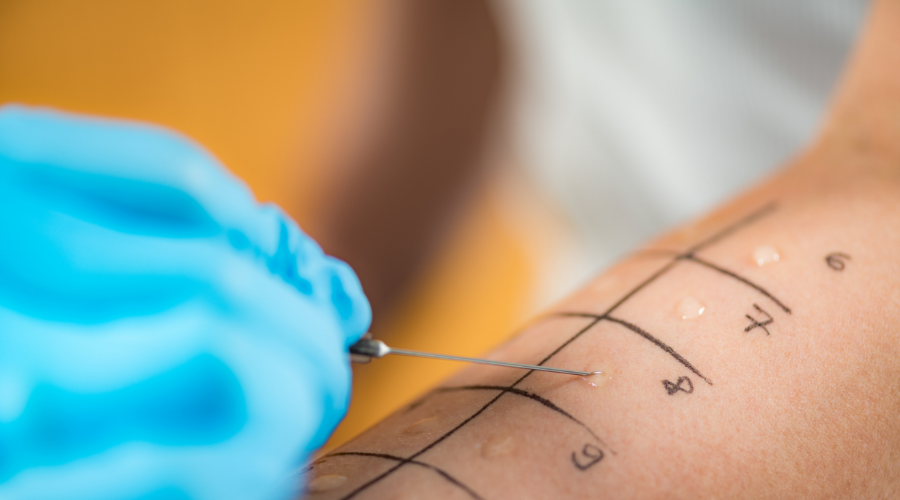
Medically reviewed by
Samantha Griffin, MSN, NP-C
Millions of people struggle with seasonal allergies or food-related allergies. Many people turn to home allergy tests in order to diagnose the cause of their symptoms. Are these home tests really all that reliable? Unfortunately, the answer may surprise you.
While these home tests can provide some insights into your condition, they should not be used as an alternative to visiting a licensed physician.
Below, we discuss how home allergy tests work. We’ll also outline the shortcomings of home testing. Our goal is to help you make informed decisions so that you can better understand your allergy-related conditions.
While these home tests can provide some insights into your condition, they should not be used as an alternative to visiting a licensed physician.
Below, we discuss how home allergy tests work. We’ll also outline the shortcomings of home testing. Our goal is to help you make informed decisions so that you can better understand your allergy-related conditions.

How Do Home Allergy Tests Work?
Most home allergy tests rely on a skin prick to obtain a small sample of blood. The tests include alcohol wipes to cleanse the area and one or two lancets that should be used to prick your finger. The blood sample is usually placed on a small card which is mailed back to the test provider’s laboratory for analysis. Results are either mailed or emailed to you. Depending on the type of home allergy test, it could assess for 50 or more allergens. Some common allergens that home tests check for include:- Dog dander
- Cat dander
- Mold
- Insect stings
- Dust mites
- Tree-related allergies (oak, mulberry, birch)
- Grass-related allergies (Bermuda, rye)
- Food allergies
Are Home Allergy Tests Effective?
Despite advancements in medical technologies and testing protocols, home allergy kits simply do not stack up against professional assessments. There are several issues that you may encounter when using home allergy tests.Your Results May Be Inaccurate
The biggest drawback to home allergy tests is that the results you receive may be inaccurate. Home test kits have a much larger variation in quality. While some are well-made, others use unreliable testing methods. At a professional allergy clinic, a licensed physician will test for allergies by looking for specific types of immunoglobulin E (IgE) antibodies. When your body experiences an allergic reaction to a specific irritant, then it will produce unique IgE antibodies. Some home test kits do not even check for IgE antibodies, which means that the results they provide do not reflect whether you are suffering from a particular allergy or not. Others check for immunoglobulin G in order to identify potential food allergies, which will not truly reveal whether the user is suffering from an allergic reaction.You May Be Experiencing Intolerance Rather than Allergies
Many people naturally assume that they are allergic to a food if it causes them discomfort. However, they may be experiencing food intolerance, not a true allergic reaction. Food allergies can potentially cause life-threatening reactions, whereas intolerance generally causes mild discomfort and digestive irritation. The same misdiagnosis can occur with other types of allergens, as well. For instance, red or irritated eyes may be the sign of an infection, rather than an allergy. An unreliable home allergy test may falsely indicate that you are allergic to a specific airborne contaminant. This could lead you to delay essential treatment due to a belief that you are dealing with a common allergy. As you can see, the unreliability of home allergy tests can pose a real danger to patients. Misinformation about your health can be more harmful than no information at all. If you believe that you are experiencing allergies, seeking care from a board-certified allergist is the best solution.You Need An Expert to Verify Results
Even if your home allergy test was accurate, an allergist will need to conduct a more thorough analysis to identify the root cause of your condition. An allergist will also be able to provide you with effective treatment options so that you can manage your allergies.What is the Most Accurate Way to Test for Allergies?
When it comes to understanding your allergens, getting tested by a licensed allergist is by far the most accurate option. These trained medical professionals conduct multiple tests to pinpoint the exact cause of your allergic reactions. Some of the advantages of professional allergy testing include:- Accurate data about your condition
- Effective treatment options
- Explanation of what your results mean
- Ability to identify and avoid potential irritants
What Types of Tests Do Doctors Use to Diagnose Allergies?
Licensed allergists use a variety of tests in order to make an accurate diagnosis. Some of the most common kinds of professional allergen tests include:- Percutaneous testing
- Intradermal testing
- Specific IgE testing
- Patch testing



